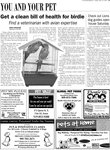Get a clean bill of health for birdie
- Publication
- Independent & Free Press (Georgetown, ON), 13 Apr 2007, p. 11
- Full Text
Find a veterinarian with avian expertise
Wings a-flutter and chirps galore. You just love birds and you're ready to take the plunge and buy one for yourself. As a new bird owner, one of the first things you must do is take your bird to a veterinarian for an exam. Of course, this won't be just any old exam. Exams for birds differ considerably from those for cats and dogs. Whatever veterinarian you choose should be familiar with birds and know what to look for. Experts recommend you find a veterinarian who is a member of the Association of Avian Veterinarians and schedule an exam within three days of purchasing your bird. Before they conduct the actual exam, the veterinarian will probably have some questions for you regarding your bird's history. They might want to know where the bird was caged, what it was fed and more importantly, how much contact it had with other birds. Depending upon where you purchased the bird, you may or may not have answers. Just be honest and do your best. After the veterinarian has some idea of the bird's history, they will start the exam. The veterinarian will check the body conformation, posture, attitude and character of respiration of your bird and mention any abnormalities they see in its beak, cere, ears, eyes, feathers, nares, oral cavity, bones, muscles, abdomen, skin and vent. They will also weigh your bird and monitor its weight at every exam there afterwards. The weight of adult birds should remain fairly constant. Excessive weight gain or loss could indicate a health problem. Depending upon what they find, the veterinarian may recommend tests after the exam. Some of these include: · Appraisal of droppings to detect the presence of internal parasites or other diseases · Blood tests to detect the presence of blood parasites, imbalances in biochemical functions, organ dysfunction and any number of diseases · Chlamyophila test to detect the presence of psittacosis or parrot fever · Radiographs to detect the presence of fractures, foreign bodies or tumors, as well as the size and relationship of internal organs, and the condition of the lungs and sacs · Tissue or fluid samples to detect the presence of abnormal bacteria or yeast growth · Virus screening to detect certain viral conditions Birds are so different from cats and dogs that many first-time owners don't notice when they are not feeling well. That's why it's important to schedule annual exams for your bird with a professional who is experienced in spotting the signs of aviary disease.
- Featured Link
- Media Type
- Newspaper
- Item Types
- Articles
- Clippings
- Photographs
- Date of Publication
- 13 Apr 2007
- Subject(s)
- Corporate Name(s)
- Association of Avian Veterinarians
- Local identifier
- Halton.News.220484
- Language of Item
- English
- Copyright Statement
- Copyright status unknown. Responsibility for determining the copyright status and any use rests exclusively with the user.
- Contact



